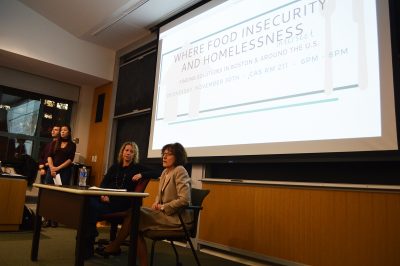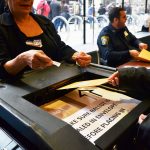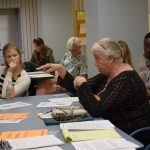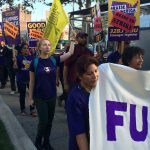
Boston University students discussed homelessness and food insecurity at a panel hosted by BU’s Student Food Rescue and Food Justice BU Wednesday night.
The panel, “Where Food Insecurity and Homelessness Intersect,” included two key figures who help to solve food insecurity throughout the Greater Boston area. Sasha Purpura, the executive director of Food For Free, and Stephanie Nichols, spokesperson for The Greater Boston Food Bank, led the discussion.
Through the quiet atmosphere of an audience of about 30 students, Purpura began with a video about her organization. The video described the organization’s mission, which is providing people with healthy food consistently.
Food For Free is currently working with more than 100 organizations in and around Boston, including Boston Medical Center and Cambridge Public Schools. In the last year, Food For Free distributed two million pounds of food, or more than 1.5 million meals, according to their website.
“Solving hunger in the U.S. is less about getting calories into people, and more about giving people consistent access to healthy food,” Purpura said.
Nichols stressed Greater Boston Food Bank’s focus on healthier foods.
“Eighty percent of our meals reach our high health standard, 50 percent of our food is perishable and over 30 percent of our food is fresh produce,” Nichols said.
Nichols added that eastern Massachusetts faces food insecurity specifically due to the area’s high cost of living.
“According to the [Massachusetts Institute of Technology’s living wage calculator], a family of four would need $70,000 a year just to meet needs — and that’s not going on vacation, that’s just to survive,” Nichols said.
Because of this, Purpura said, it often comes down to tough choices between health and hunger for some families.
“Families with hungry kids end up having to choose between a $4 Burger King meal versus one head of lettuce and a tomato,” she said.
Purpura said additional health problems — such as diabetes and heart disease — often arise from choosing these cheaper meals, leading to even more expenses and a further inability to buy healthier foods, even with poor health conditions.
Tiffany Guan, a member of the Student Food Rescue team, helped organize the discussion.
“As SFR volunteers, we mainly attract busy people who only have an hour here or two hours there to volunteer and who want to do good work,” said Guan, a junior in the College of Arts and Sciences. “And so a lot of the time, you don’t really experience the full issue. You kinda just go there and do your thing and leave — you don’t have time to reflect or think about how much food insecurity is affecting so many people.”
Attendees were encouraged to take action, raise awareness and remain conscious. They are also asked to volunteer, donate and ask facilities on campus where the leftovers are going.
Julia Hess, a freshman in the College of Communication, said she found the panel enlightening and interesting. She also expressed interest in getting involved with the cause.
“Community service has always been a big part of my life,” Hess said. “And growing up, I definitely helped. My dad and I would make meals for the local church. I was just very curious to listen to the panel and learn more about how I can get involved in fixing the food waste issue.”
Max Crossan, a freshman in the Questrom School of Business, said the information provided at the panel surprised him.
“I think a lot of the issues they raised were really interesting,” Crossan said. “I never thought of them before, like what it takes to get to food and all the barriers involved. It’s a lot more difficult than I originally realized.”
Taylor Whiteman, a Questrom sophomore, said he was glad to hear from Purpura that Food For Free is picking up BU’s surplus food.
“It’s just great to see how the journey to end food insecurity is a lot of little steps, and it’s gonna take time,” Whiteman said, “but each and every one of us can make a small stride each day and hopefully eventually end this.”












